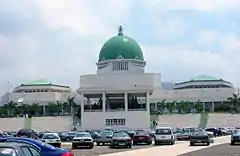8th Nigeria National Assembly
The 8th National Assembly of the Federal Republic of Nigeria was a bicameral legislature inaugurated on June 9, 2015 and the assembly ran its course until June 9, 2019.[1]
| 8th National Assembly | |||||
|---|---|---|---|---|---|
| |||||
 National Assembly Complex | |||||
| Overview | |||||
| Meeting place | National Assembly Complex | ||||
| Term | June 9, 2015 – June 9, 2019 | ||||
| Election | Nigerian general election, 2015 | ||||
| Website | nass.gov.ng | ||||
| Senate | |||||
| Members | 109 | ||||
| Senate President | Bukola Saraki | ||||
| Deputy Senate President | Ike Ekweremadu | ||||
| House of Representatives | |||||
| Members | 360 | ||||
| Speaker of the House | Yakubu Dogara | ||||
| Deputy Speaker of the House | Yusuf Sulaiman Lasun | ||||
 |
|---|
| This article is part of a series on the politics and government of Nigeria |
|
|
Composition
The assembly comprises the Senate and the House of Representatives.[2] The National Assembly comprises 469 members elected across the 6 geopolitical zones of Nigeria.[3] The House of Representative consists of 360 members and the Senate, a total of 109 members from which 59 were elected on the platform of the APC and 49 were elected on the platform of People's Democratic Party following the sudden death of Senator Ahmed Zanna elected on the platform of PDP to represent Borno Central.[4][5]
Only six of the senators were women. The women elected were Stella Oduah and Uche Ekwunife who both represent Anambra, Monsurat Sunmonu from Oyo state, Fatimat Raji Rasaki, Grace Okoji Oku, Oluremi Tinubu and Binta Garba.[6]
Parliamentary elections
The Parliamentary elections was conducted at the National Assembly Complex, Abuja, the federal capital territory, Nigeria.[7]
Senatorial election
The Assembly was inaugurated on June 9, 2015 at around 10.am following the reading of the proclamation letter of General Muhammadu Buhari, the President of Nigeria, who ordered the inauguration of the Assembly. The letter was read by Alhaji Salisu Maikasuwa, the Clerk of the National Assembly.[8][9] Out of the 59 Senators-elect, only 57 were in attendance, in line with the Senate Rule that stipulated that only two-thirds of the total Senators need to be present to form a quorum.[10] Senator Bukola Saraki was nominated as candidate for the office of President of the Senate by Senator Ahmad Sani Yerima representing Zamfara Central and his nomination was seconded by Senator Dino Melaye representing Kogi West.[11] The clerk called for further nomination but the other aspirant for the office, Senator Ahmed Ibrahim Lawan, representing Yobe North was absent and the clerk asked twice, if there is any other nomination before he drew the curtain to declare Senator Bukola Saraki winner and Senate President-elect of the Federal Republic of Nigeria.[12] Senator Saraki's victory was followed by a resounding applause. He was led to the platform to take the oaths of office and allegiance led by the clerk.[13] Saraki assumed offices immediately and took his seat as the Senate president, while the Assembly proceedings continued.[14] Senator Ike Ekweremadu, the Deputy Senate president of the 6th and 7th National Assembly was re-elected following his nomination by Senator George Thompson Sekibo.[15] Senator Ekweremadu polled a total votes of 54 to defeat Senator Mohammed Ali Ndume, who polled only 20 votes.[16]
House of representatives election
The election of the leadership of House of representatives was also conducted by the clerk.[17] After two hours of voting process, Honorable Yakubu Dogara emerged as the Speaker of the Nigerian House of Representatives by 8 votes having polled 182 votes with 1 vote above the simple majority stipulated by the 1999 Constitution as mended, against honorable Femi Gbajabiamila who polled 174 votes and two ballots were voided.[18] Dogara was sworn in by the clerk, Alhaji Maikasuwa and he assumed office as Speaker of the Nigerian House of Representatives at around 4.45 pm.[19]
Members
Senate
Abia
Adamawa
Akwa-Ibom
Anambra
Vacant (Bauchi South)
Bayelsa
Benue
Borno
Cross River
Delta
Ebonyi
Edo
Ekiti
Enugu
FCT
Gombe
Imo
JigawaAbdullahi Abubakar Gumel (Jigawa N/West)
Kaduna
Kano
Katsina
Kebbi
Kogi
Kwara
Lagos
Nasarawa
Niger
Ogun
Ondo
Osun
Oyo
Plateau
Rivers
Sokoto
Taraba
Yobe
Zamfara
References
External links |
